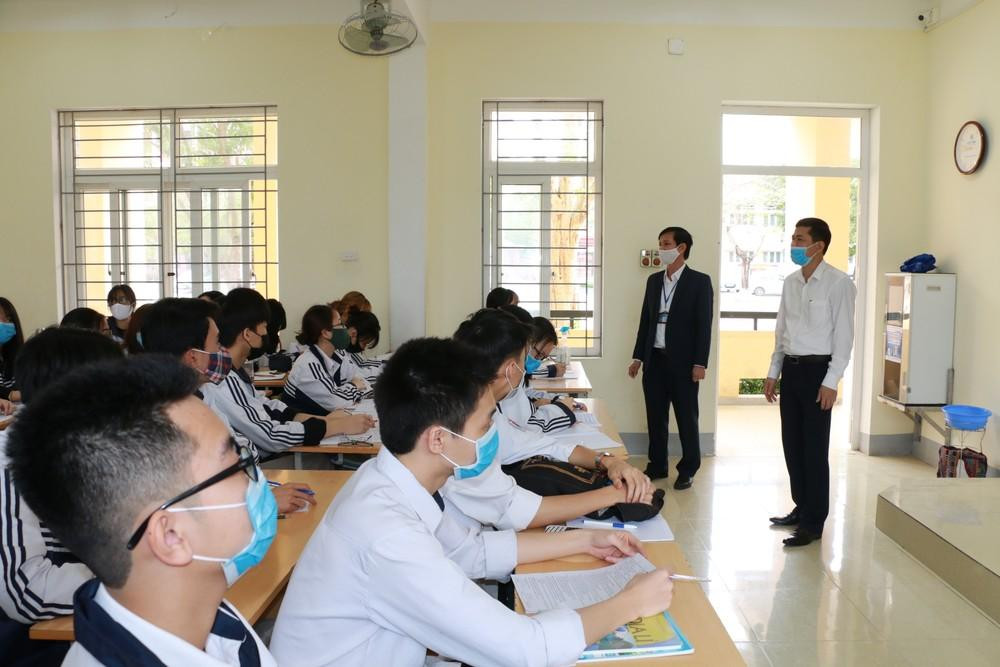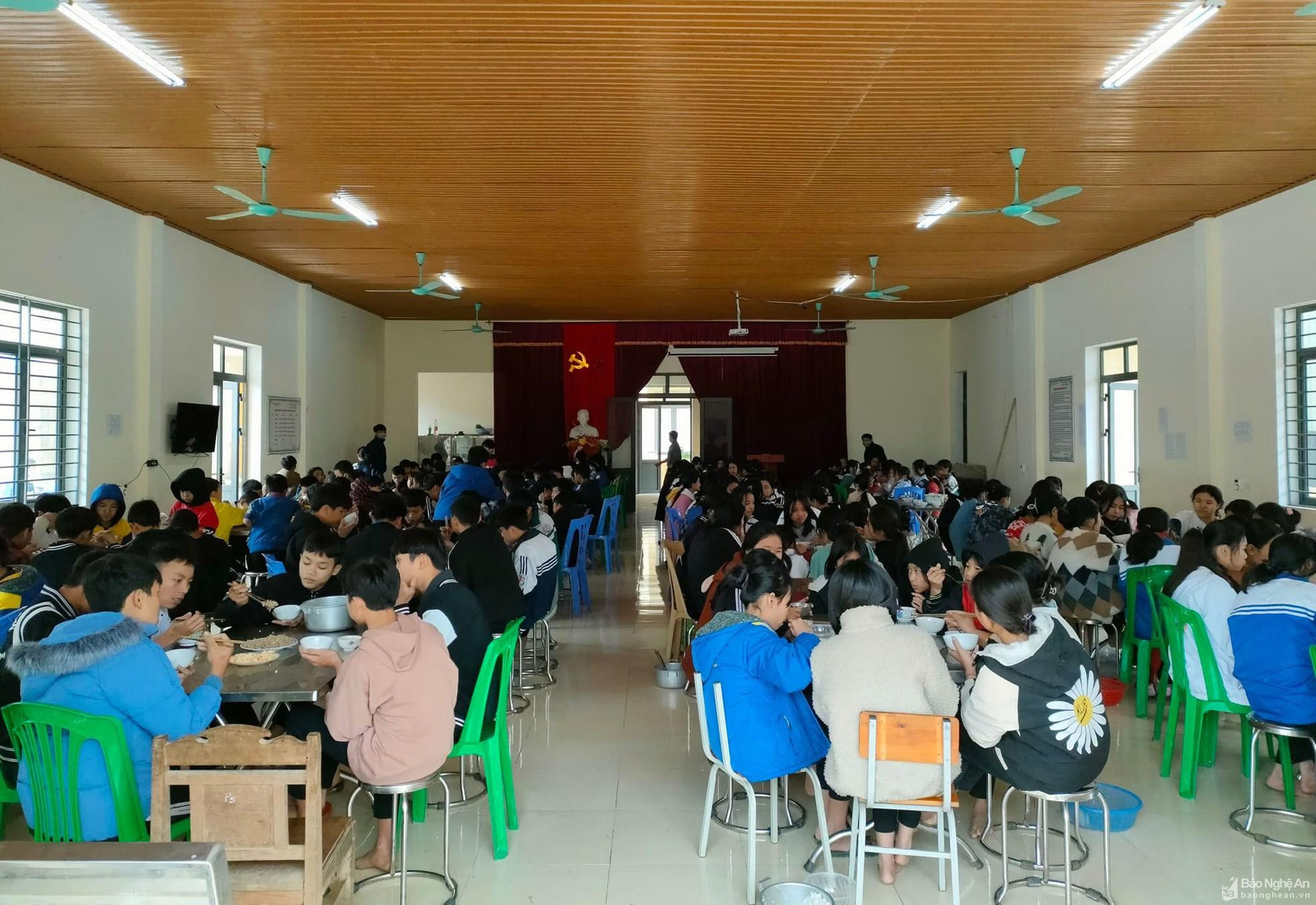Nghe An Department of Education and Training guides schools on fees
(Baonghean.vn) - The Department of Education and Training will strengthen inspection and examination of revenue and expenditure at the beginning of the school year at educational institutions, promptly correcting over-collection and illegal collection.
Nghe An Department of Education and Training has just issued an official dispatch guiding the management of revenue and expenditure for the 2022-2023 school year at public educational institutions in the province.
Accordingly, tuition fees will be implemented according to the provisions of Resolution No. 14, dated July 14, 2022 of the People's Council of Nghe An province. Specifically, for urban areas, tuition fees for 3 levels of preschool, middle school and high school are the same, all 300,000 VND/student/month.
Meanwhile, for rural areas, preschool and junior high school is 100,000 VND/student/month; high school is 200,000 VND/student/month. As for ethnic minority and mountainous areas, preschool and junior high school is only 50,000 VND/student/month; high school is 100,000 VND/student/month.
The Department of Education and Training stipulates that the tuition fee for online learning for public preschools and general education institutions is 80% of the tuition fee for direct learning. Students with permanent residence in a region must pay tuition fees according to that region...
 |
Mr. Thai Van Thanh (left) inspects teaching and learning in a class in Vinh City. Photo courtesy |
Regarding the organization of boarding in public educational institutions, the maximum collection is 200,000/student/month to pay for the cost of hiring cooks and the cost of organizing boarding at all levels. As for educational institutions that enjoy policies under Decree No. 105/2020/ND-CP and Decree No. 116/2016/ND-CP of the Government, the maximum collection is 100,000/student/month. The unit calculates reasonable costs for organizing boarding cooking; commensurate with the scale of the school, students and the area for hiring workers in the area; at the same time, balance the supported budget to propose a collection level appropriate to the learners' ability to contribute.
Do not apply the fee to hire cooks for students in educational institutions that have been supported according to the provisions of Resolution No. 10/2019/NQ-HDND dated July 12, 2019, stipulating the support regime for staff of ethnic minority boarding schools and ethnic minority boarding schools in Nghe An province.
Regarding the fee for organizing mock exams for final year students, it is not more than 50,000/student/subject.
Regarding funding for educational institutions, the Department of Education and Training requires ensuring the principles of voluntariness, publicity, transparency, schools must not force, must not stipulate an average funding level, must not stipulate a minimum funding level, must absolutely not assign funding mobilization targets to each class (or each homeroom teacher), must not take advantage of funding for education to force contributions and must not consider funding mobilization as a condition for providing educational and training services (or a condition for evaluating and ranking in competition).
The Department requests that educational institutions compile statistics, review, and evaluate the current status of their existing facilities into asset groups according to Circular No. 13/2020/TT-BGDDT dated May 26, 2020 of the Ministry of Education and Training promulgating regulations on standards for facilities of kindergartens, primary schools, junior high schools, high schools, and multi-level general schools. Based on statistical data and evaluation of the current status of facilities combined with forecasts of the unit's development scale to determine the need for additional facilities. Based on the investment portfolio that has been built for each year, the school year's operational plan, the school's education program, balancing the unit's resources (state budget, tuition revenue; education service revenue, revenue from piloting advanced schools according to international integration trends, etc.), local socio-economic conditions and income and living standards of local residents, the unit chooses which portfolio can use the unit's available resources, which portfolio needs to mobilize from funding sources to build a suitable funding mobilization plan for each school year (avoid duplication of content that has been built in revenue sources).
 |
Meals for boarding students in mountainous areas. Photo: NTCC |
The Department of Education and Training will strengthen the inspection and examination of the revenue and expenditure situation at the beginning of the school year at educational institutions, promptly correct the situation of overcharging and illegal collection, handle or propose strict handling of cases of intentional violation of regulations. Publicly announce the hotline phone number so that people and parents can promptly report illegal revenue and expenditure.
The Department also requested the District People's Committee to direct relevant departments and offices to review the collection fees according to the schools' requests, in accordance with the actual situation of each locality and each unit according to the management hierarchy (not equalizing the collection levels), to submit to the District People's Committee for written agreement before organizing the implementation of service collection fees to serve and support the educational activities of the school.
Regarding collection and payment on behalf of others, direct the Department of Education and Training and relevant departments to be responsible for guiding schools to organize the collection of consensus from parents for implementation. Issue documents guiding the management of revenue and expenditure at the beginning of the school year for educational institutions in the area; Develop a mechanism to monitor fundraising at educational institutions, direct relevant departments to approve plans and settle fundraising. Strengthen inspection and examination of revenue and expenditure at educational institutions; promptly rectify over-collection and illegal revenue and expenditure, handle violations under the authority of the District People's Committee. Be responsible to the Provincial People's Committee for the management of revenue and expenditure of educational institutions in the area according to the management hierarchy. Announce hotline numbers for learners, parents and people to promptly report illegal revenue and expenditure.
In addition, the Department also requested that educational institutions publicly post, disseminate, and thoroughly understand to teachers, staff, parents, and students documents directing and guiding the implementation of collections in the education sector. All collections must be fully notified to each parent in writing or publicly posted at the unit or in other forms (clearly stating the content of the collections, collection levels, objects and purposes of use, and expenditure content).
Extend collection time and do not collect multiple fees at the same time. Encourage exemptions and reductions of the above fees (in addition to tuition fees) for students from families with preferential policies or economic difficulties.
Implement well the coordination work between the commune-level government, the school and the parents' association in developing plans, organizing implementation and managing the use of revenue and expenditure sources. Build a close monitoring mechanism between the school council, people's inspectors and community supervision (parents' association) on service revenues, supporting the school's educational activities and voluntary contributions...



